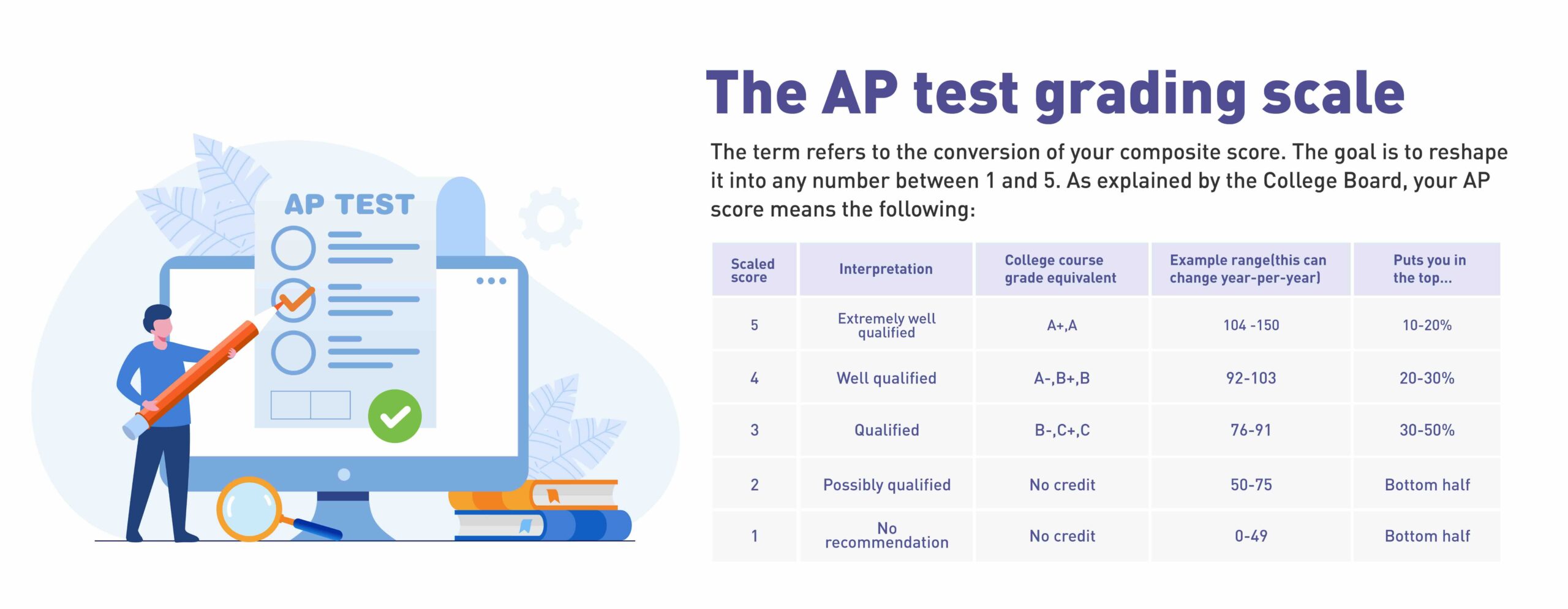An exam in AP is graded with a score between 1 and 5 (the higher the number, the better the score). But how exactly does the AP test grading scale work and what are the crucial things you should know? That, along with the best approach to get some much-needed AP exam practice, will be revealed in today’s post.
The AP test grading scale
The term refers to the conversion of your composite score. The goal is to reshape it into any number between 1 and 5. As explained by the College Board, your AP score means the following:
| Scaled score | Interpretation | College course grade equivalent | Example range (this can change year-per-year) | Puts you at the top of |
| 5 | Extremely well qualified | A+, A | 104-150 | 10-20% |
| 4 | Well qualified | A-, B+, B | 92-103 | 20-30% |
| 3 | Qualified | B-, C+, C | 76-91 | 30-50% |
| 2 | Possibly qualified | No credit | 50-75 | Bottom half |
| 1 | No recommendation | No credit | 0-49 | Bottom half |
Sources: College Board, Bestcolleges.com
To get a passing grade, you’re going to need to score at least 3 or higher (with certain classes requiring 4 or better). To put things in perspective, scoring a 5 on your AP exam essentially puts you in the top 10-20%.
AP test terms explained
- Scaled score (converted from your composite score – see the table above)
- Composite score (the raw score you get, aka. your total number of points)
The reasons why your AP score matters
AP for students can be quite an important milestone because most colleges look at it through the lens of admission criteria. Bear in mind that different colleges might take your AP score into consideration in different ways, so always double-check with your college of choice.
Below, we will list the main reasons why AP score matters and why you should strive to score as high as possible:
- Earn college credit. Score well on your AP exam and certain colleges will give you college credit. And yes, this counts for your graduation requirements, meaning that taking fewer college courses will ultimately be needed.
- Satisfy college requirements. Even if you end up not being awarded any college credits, the good news is that scoring high on your AP exam may allow you to skip certain college courses (like mandatory writing classes) and jump straight into more specialized classes for your major.
- Added appeal to college admissions officials. Even if your AP score doesn’t end up bringing you college credit, the very fact that you opted for the AP exam can earn you the respect of college admissions officials, since it tends to be more advanced than what is taught in typical high school courses.
How AP tests are scored
An AP exam test is broken down into the following two sections:
- Multiple choice
- Free response
Keep in mind that different sections of the AP exam are weighted differently (this, however, may not apply to all AP exams).
The multiple-choice section
Your composite score in this section is simply the total number of points scored (the sum of all your correct answers). Keep in mind that, for the multiple-choice section, there are no negative consequences for answering incorrectly, so you will not lose points by doing so. Grading it is rather straightforward and is executed by a computer.
The free-response section
This is the composite score that needs to be converted using the AP test grading scale. In addition to that, it’s important to ensure the difficulty of the AP exam stays roughly the same across the years if possible, which is what ultimately gives meaning to the score you receive.
Even if a certain year’s AP exam is comparatively more difficult, the final grade needs to be adjusted accordingly to reflect that and not put the students at a disadvantage. According to the AP test grading scale, the free response section is graded from 1 (the lowest) to 9 (the highest).
As you can imagine, grading the free response section is slightly more complicated. Typically, it’s a convention that takes place in the first two weeks of June where teachers gather to grade the exams. This is also the reason why the AP testing schedule is designed to be this way, with results typically not available prior to the month of July, despite the exam itself being held in May. Bear in mind that typically no points are deducted for minor spelling mistakes.
Getting a composite score
As we’ve already established, the composite score is your raw score. It consists of all the points you’ve scored in the multiple choice section plus the free response section with proper weighting applied to it. In the case of AP English, this is as follows:
- The multiple-choice section is worth 45%
- The free-response section is worth 55%
The composite score can be from 0 to 100 (and sometimes from 0 to 150). After that, it needs to be converted to a number between 1 and 5 – this is what’s referred to as the scaled score. So when talking about the conversion, we need to think in terms of ranges (for instance, a scaled score of 5 could mean anything between 110 and 150 in terms of the raw composite score).
Note: Your final AP examination report will only show the scaled score and not the composite score.
Converting a composite score to a scaled score
Now that we’ve established how composite AP scores are converted into scaled scores, here’s an example from one of the school years. Keep in mind that this is not a universal AP conversion table by any means, as each year, the conversion will be slightly different. However, it serves as a good example you can study to get a grasp of how the composite → scaled conversion works.
| Composite Score (0-100 or 0-150) | Scaled Score (1-5) |
| 104-150 | 5 |
| 92-103 | 4 |
| 76-91 | 3 |
| 50-75 | 2 |
| 0-49 | 1 |
Is the conversion formula universal across all other AP tests?
Since the conversion table differs from year to year, what is the case for other AP tests? Once again, it can get complicated due to different sections of a certain test having different weights. Comparatively speaking, AP Calculus AB has fewer multiple choice questions and more free-response questions. In addition to that, each section is weighted equally. So rather than trying to aim for barely making it into a certain range, it’s a much better use of your time to give it all you’ve got and shoot for the highest possible grade you can get.
Average AP scores in 2024
Key highlights include:
- Almost half of the participants (45%) scored a 5 on AP Calculus BC, whereas only 5% managed to score a 5 on AP Research.
- Ironically, as much as 5% scored a 1 on AP Calculus BC, while only 1% scored a 1 on AP seminar.
- 89% got a passing score on AP Seminar, while only 75% got a passing score on AP Physics C.
To view the complete statistics and average AP scores in 2024, kindly refer to the official College Board 2024 AP score distributions page.
What’s the best AP exam preparation strategy?
You’re probably well aware of this already, but just to re-iterate: last-minute cramming never works. At Novel Prep, we’re strong believers in long and steady AP exam practice that’s equally spread out across the school year. This is what we advise our students because it’s been proven to work times and times again. The reason is that you will have plenty of time to get additional help in the form of AP exam prep courses that will give you the knowledge need as well as boost your confidence.
When preparing for your AP test, you have 2 options:
Studying alone
If you decide to go down that route, the benefit is that it won’t cost you anything. However, keep in mind that this is regarded as the slower approach – what you’ll save in terms of money will cost you in terms of time. With that being said, there are certain free AP preparation resources you can get on the official College Board website. This includes:
- Daily practice sessions
- Live review recordings
- On-demand videos
This should get the job done when it comes to getting familiar with different question types and the content of the exam. But once again, we need to emphasize that you’ll be left on your own, without any kind of personalized feedback which could make it harder for you to progress and see where you stand.
Therefore, we suggest you consider an alternative…
Enrolling in a structured AP exam prep course
- Do you hate not knowing what to focus on when preparing for your AP test?
- Do you struggle with time management?
- Does your approach to learning often lead to burnout?
- Can’t figure out how to improve in certain areas?
- Don’t have the right resources for studying?
- Can’t calm your nerves before the AP exam?
- Are you unfamiliar with the AP exam format?
If any of the above resonates with you, you’re the perfect candidate for Novel Prep’s AP Prep course – your path to academic excellence. By enrolling, you get to:
- Save valuable time. We will show you what to focus on to get results in the fastest and most efficient manner possible, thereby saving you tons of time.
- Earn college credit. AP in your report clearly showcases your motivation to succeed in an academic environment, and you can even earn college credit if you do well.
- Receive personalized support. The Novel Prep tutor you choose to work with will assess your abilities and tell you exactly what skills you need to brush up on to progress.
- Progress at your own pace. We offer personalized online tutoring and interactive online group sessions, allowing you to tune in from wherever you happen to be located.
- Alleviate test anxiety. Don’t let your nerves wreck your performance on the exam! Our Novel Prep tutors will give you the counseling you need to sit behind the driver’s wheel of your emotions, teaching you effective stress management strategies along the way.
- Access the best resources for studying. This includes mock questions, video explanations, review guides and more.
- Enjoy our results guarantee. Our tutors have a proven track record of helping thousands of students just like you achieve their academic goals. We can accurately forecast how much you can score and how quickly we can bump you to the next grade.
Read more about Novel Prep’s AP Prep course here!
Conclusion
To sum it up, the AP test grading scale helps you convert your composite or raw AP test score to a scaled score that ranges from 1 to 5, which is the result you’ll see on your AP report. Keep in mind that certain sections of the AP exam may be weighted more than others. In addition, there is no such thing as a straightforward conversion from composite to scaled, since the composite score total may very well differ from year to year.
FAQs
Does your AP score matter when entering college?
It’s optional, but the mere fact that you’ve chosen to participate can work in your favor in the eyes of the college admission officials. The reason is that the AP exam is designed to be more advanced than the standard high school curriculum, and a passing grade can give you an edge when applying to the most prestigious universities.
Is there a universal conversion formula for converting the composite into a scaled AP score?
No. Different AP exams have differently weighted sections. In addition to that, the total number of questions might not be the same. Plus, different years might mean slight comparative differences, so it’s impossible to provide a universal conversion formula. You can, however, study previous years’ conversion tables to get a rough idea of how to convert your score.
What is the passing AP grade?
3 or greater. Keep in mind that certain colleges want to see a grade of 4 or more to award college credit.
Is a 4 a good AP score?
Most students should be happy with a 4. The only exception is if you’re trying to apply to the most prestigious universities out there.
Is a 3 a good AP score?
While 3 is generally regarded as a passing score, you might need more than that if you’re trying to apply to the most prestigious universities out there that generally want to see a 4 or a 5.
Is a 2 a good AP score?
Generally speaking, 2 is not a passing score, and therefore not good. In case you get a 2, it might be better not to submit your score to the colleges you’re applying to.
Is your AP score publicly visible?
Only to the universities you’re applying to. Unless you give them permission to, not even your parents can see it.
What is the average AP score?
In 2023, the mean AP score was 2.96. More than 60% of test takers scored 3 or higher.
What are the AP core courses?
AP English, AP Mathematics, AP Physics, AP Chemistry, AP Biology.
Which is generally regarded to be the hardest AP exam?
AP Physics 1 has the highest failure rates. Almost half of the students who partake receive a failing grade.
Can an AP score be appealed?
Yes. If you believe there was an error in your score, you can request to have it rescored. This will set you back $30. The new score will be your final score and cannot be appealed one more time. You can, however, retake the test the following year.



